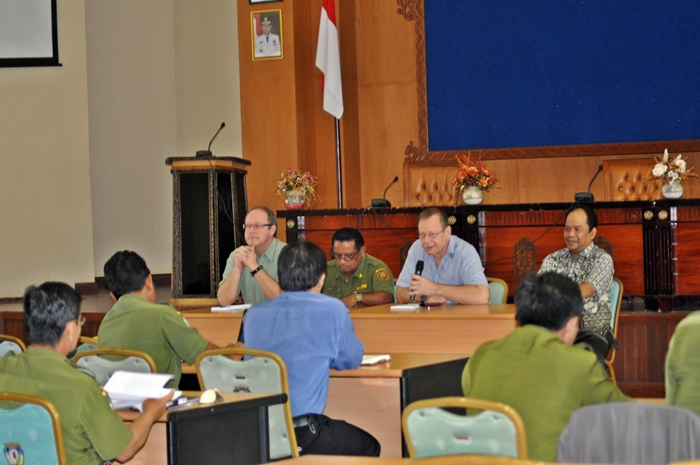
In the first two weeks of February FORCLIME Component 2 conducted workshops in each of the three pilot districts in order to prepare the FORCLIME annual work plan and align it with the district planning. In each location this “Road Show” was attended by representatives from the District Forest Service, local agencies at district level, Technical Units of the Ministry of Forestry at province level, NGOs and communities. Objective of the workshops was to share information about the progress made in 2011 and to synchronize and harmonize the work plan of Component 2 for 2012 with the planning of the local partners, particularly the District Forest Services.
The proposed annual programme consists of activities in the following four main areas of work:
- Institutional strengthening of FMUs, capacity building related to FMU management, and preparing of FMU management plans;
- Institutional strengthening of REDD+, support of the preparation of regional policies related to REDD+, collecting and processing of baseline data and capacity building on the topic of REDD+;
- Facilitating local community efforts to obtain Village Forest permits, preparation of Village Forest management plans, capacity building in Community Based Forest Management (CBFM) implementation and development of demonstration plots for agro-forestry or Non-Timber Forest Products (NTFP);
- Supporting the District Forest Service in developing strategic plans and identifying inputs from communities for forest development.
During the workshops some issues were raised which need to be followed up by the FORCLIME Programme and its partners:
- The need to have an in-depth study about the authority of district government in forest management, including the aspect of licensing. The study is necessary to determine the main tasks, responsibilities and functions of the District Forest Service online and of the FMUs and their future relationship.
- The need to develop a Memorandum of Understanding (MoU) between the Ministry of Forestry and other parties (such as forest concession holders) involved in REDD+ Demonstration Activities (REDD+ DA) to ensure forest concession holders also have a strong commitment to implement activities in the field.
- The need to develop incentives for the parties that work together in REDD+ Demonstration Activities so that any innovations achieved in these pilots can be rewarded and maintained after the project finishes.
- The need for flexibility in the implementation of REDD+ DA programmes in order to be able to create innovative approaches in the field as pilot measures which may not be covered by the existing legislative framework (such as combining IHMB and carbon stock measurement, silvicultural practices, conflict resolution, etc.).
For more information, please contact:
Helmut Dotzauer (helmut.dotzauer@giz.de) or
Tunggul Butarbutar (tunggul.butarbutar@giz.de) or
Edy Marbyanto (edy.marbyanto@giz.de)






